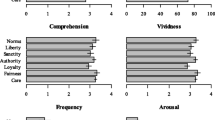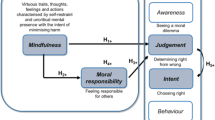Abstract
Moral understanding is a species of knowledge. Understanding why an action is wrong, for example, amounts to knowing why the action is wrong. The claim that moral understanding is immune to luck while moral knowledge is not does not withstand scrutiny; nor does the idea that there is something deep about understanding for there are different degrees of understanding. It is also mistaken to suppose that grasping is a distinct psychological state that accompanies understanding. To understand why something is the case is to grasp or see why something is the case and grasping and seeing are ways of knowing.
Similar content being viewed by others
Notes
I use the word “because” here broadly. The “because” in “P because Q” is not just a causal one; it covers a range of relations between different classes of facts: the relations of supervenience, being a reason for, and so on.
Source of text: http://www.gutenberg.org.
Or whatever non-moral training was relevant in a particular case.
In fact, for what it's worth, some people pressed for more details of the case and even offered their diagnosis of why it might seem to someone that there is understanding in Case 1.
Pritchard (2009).
Whether or not Burning House, Comanche and Case 2 are in fact exactly like the fake barn case is an interesting question in its own right.
It is questionable whether reading T in a different book that is also so very different from the book read in the actual world counts as the “same way or method”. Is the way in question reading this particular book or reading any book, for example? In the interest of keeping things simple, I leave this issue aside and assume the safety-based account has a more or less satisfactory answer to this question.
Recall that in at least some versions of the fake barn case, which is a classic example of environment luck, the proposition believed in close worlds remains the same, i.e., that there is a barn.
Grimm (2006), though extremely sympathetic to the view that understanding is a species of knowledge, makes a similar claim about what understanding requires. Following James Woodward (2003), he speaks of understanding in terms of having an ability to answer “what-if-things-had-been-different?” questions.
Hills (2010: 195).
This moral epistemology can be developed in a way that is consistent both with Moral Generalism and with Moral Particularism.
See, for example, Hills (2010: 190–93). On page 192, she explains in a lengthy footnote that the relevant reasons are those that make the believed moral proposition true and not “non-explanatory” evidence like testimony.
In the book Blink, which is about the importance of “snap judgements”, Malcolm Gladwell gives examples of different experts who made certain correct judgements in their domain without being able to fully articulate at the time why they thought they were correct. For example, the book begins and ends with the case of the identification of a kouros for the J. Paul Getty Museum in California. Evelyn Harrison, who was one of the world’s foremost experts on Greek sculpture, was one of those consulted in the process. Her reaction on being presented *with* the kouros, and being told that the museum was about to purchase it after extended examination by various people, was: “I am sorry to hear that”. But Harrison wasn’t able to say what it was about the kouros that had promoted her reaction; she only had a sense that there was something amiss about it. When the art historian Federico Zeri saw the kouros, he found himself staring at the sculpture’s fingernails. “In a way he couldn’t immediately articulate, they seemed wrong to him” (Gladwell 2006: 5). Upon seeing the kouros, the first word that occurred to Thomas Hoving, the former director of the Metropolitan Museum of Art in New York, was ‘fresh’, and “fresh” is not supposed to be the right reaction to have to a two-thousand-year-old statue. Gladwell gives other examples of experts, ranging from those of marriage, war strategy, music, and so on, where the expert in question initially had the bare minimum explanation of their judgement to offer. For instance, a common kind of explanation they were able to think of was comparative claims, such as ‘this is not like that’, or ‘there’s just something not right about it’.
I explore the notion of moral expertise and success in a separate paper.
In a recent paper that I discovered after having written this section, Pritchard voices a similar concern about Grimm’s views on grasping.
References
Bengson, J., & Moffett, M. A. (2012). Two conceptions of mind and action: Knowing how and the philosophical theory of intelligence. In J. Bengson & M. A. Moffett (Eds.), Knowing how: Essays on knowledge, mind and action. Oxford: Oxford University Press.
Gladwell, M. (2006). Blink. London: Penguin Books.
Grimm, S. (2006). Is understanding a species of knowledge? British Journal for the Philosophy of Science, 57, 515–535.
Hawthorne, J. (2003). Knowledge and lotteries. New York: Oxford University Press.
Hills, A. (2009). Moral testimony and moral epistemology. Ethics, 120, 94–127.
Hills, A. (2010). The beloved self. Oxford: Oxford University Press.
Kvanvig, J. (2003). The value of knowledge and the pursuit of understanding. New York: Cambridge University Press.
Poston, T. (2009). Know how to be Gettiered? Philosophy and Phenomenological Research, 79, 743–747.
Pritchard, D. (2005). Epistemic luck. New York: Oxford University Press.
Pritchard, D. (2009). Knowledge, Understanding and Epistemic Value. In A. O’Hear (Ed.), Epistemology. New York: Cambridge University Press.
Pritchard, D. (2010). Safety-based epistemology: Whither now?. In Steup, M., Turri, J., & Sosa, E. (Eds.), Contemporary debates in epistemology. Oxford: Wiley Blackwell.
Stanley, J. (2007). Knowledge and practical interests. Oxford: Oxford University Press.
Stanley, J. (2011a). Knowing (How). Nous, 45, 207–238.
Stanley, J. (2011b). Know how. Oxford: Oxford University Press.
Acknowledgments
I would like to thank Timothy Williamson, Roger Crisp and Corine Besson for providing some very helpful feedback on earlier drafts of this paper.
Author information
Authors and Affiliations
Corresponding author
Rights and permissions
About this article
Cite this article
Riaz, A. Moral understanding and knowledge. Philos Stud 172, 113–128 (2015). https://doi.org/10.1007/s11098-014-0328-6
Published:
Issue Date:
DOI: https://doi.org/10.1007/s11098-014-0328-6




